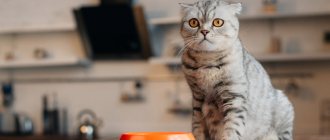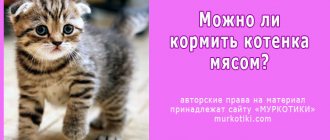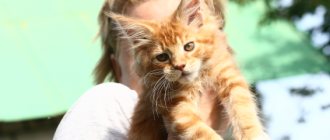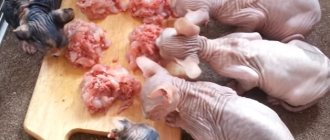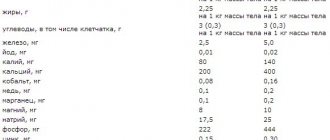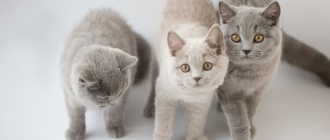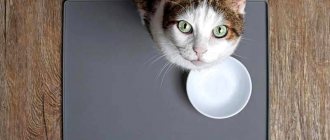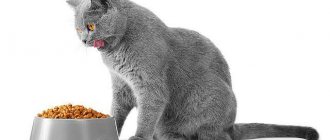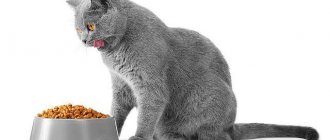Properly balanced natural food for British cats is always healthier than industrial food, even if it is high quality food. There are several reasons for this. This article talks about the benefits of natural nutrition and how to organize it correctly. After all, feeding British cats natural food is not the same as food from the human table. So what is the best thing to feed a British cat if we are talking about a natural cat?
Dry and wet food for the British
A more simplified method of feeding a British cat is based on ready-made food.
This option is great for owners who are unable to regularly prepare healthy food for their pets. The main thing is to choose the right food and calculate the daily intake in accordance with the age of the kitten. Responsible manufacturers create high-quality products that contain all the vitamin and mineral complexes necessary for the British. The range of such products includes a wide variety of compositions in dry and canned forms. When choosing, be sure to study the manufacturer’s recommendations published on the packaging!
Which food to choose, dry or wet, is up to you! You can combine these two types in an approximate ratio of 50/50, 60/40 or 70/30%. If the British cat is fed exclusively dry food, it is necessary to provide the animal with free access to clean drinking water.
The canned product is placed in a clean bowl in strictly measured quantities for one feeding. It is unacceptable to leave food “for later”; after each feeding, the animal’s bowl is cleared of product residues and thoroughly washed with clean water.
Advice from experienced breeders:
- For favorable growth and development, combine dry food with wet food. It is better to serve canned products for breakfast and dinner, and during the day you can feed your pet with dry food.
- Even if you feed your cat exclusively prepared food, regularly add pieces of fresh meat to the standard diet.
- The best food for a purebred British dog is premium (for example, Whiskas, Hills). Do not buy the budget version of the product, as these formulations do not contain enough necessary elements for proper growth and development. After feeding with cheap food, complications in terms of physical health are often observed. If you consume low-quality products, your kitten may develop urolithiasis and other chronic ailments.
- If you plan to castrate a mature British cat, buy special food with the appropriate label. These products contain a balanced complex of essential microelements, taking into account hormonal changes in the animal’s body. Similar rules are followed for cats that have been sterilized.
Special Additives
Special additives to the food can also provide a special shine, thick coat, health and activity of the animal. But you can only give those that are recommended by veterinarians and breeders.
Among these additives are pharmaceutical brewer's yeast, which is needed for beautiful coat, and vegetable oil, which relieves many intestinal problems. The oil is given in the amount of half a teaspoon per day (a few drops are enough for kittens).
Special vitamins are produced; when choosing them, you need to take into account the animal’s age, gender, and health status.
IMPORTANT! When consuming vitamins, your pet must be provided with fresh and high-quality water.
What foods should you feed your Briton at home?
It is important to understand that not a single British cat can live without meat products. Previously, such food is exposed to low temperatures in the freezer compartment of the refrigerator, where the meat remains for at least two days
Thawed meat does not contain harmful microorganisms or bacteria and is therefore suitable for cats to eat raw. It is advisable to give preference to beef, which is cut together with films and veins. This meat can be given daily. It is better not to include veal in the food of a domestic cat, since it contains virtually no enzymatic substances.
When feeding an animal lamb, pork or game, they must be subjected to heat treatment. Otherwise, helminths or much more serious parasites may appear in the cat’s body. The British also like offal - kidneys, liver, heart or lungs, cut into pieces. Such a meat product cannot be cut very finely so that the pet does not swallow it, practically without chewing. Liver can only be used from beef or chicken, and never from pork.
Boiled fish is beneficial for the health of a British cat. Eating raw fish is undesirable due to the fact that it destroys B vitamins in the body. It is advisable to use marine varieties of fish. But it is impossible for fish to take up a large part of the animal’s food. A castrated animal can be given fish no more than once a month. Chicken meat must first be boiled and bones removed from it, if any. It is better to give it together with broth no more than 3-5 times a week.
The British food can consist of chicken and quail yolks, both boiled and raw. You can mix egg yolk with dairy products and give it to your pet 2-3 times a week. Whole eggs can be cooked like an omelet without adding spices or salt and can also be given to a British cat. Separately, the animal can be fed with fermented milk products. However, veterinarians do not recommend giving milk in its pure form.
Nutrition rules
Like other breeds, the British Fold cat can be fed in the form of natural products or in the form of ready-made food. Each of them has its own advantages and disadvantages.
But if it is not possible to strictly follow the diet, constantly weigh portions and count calories, it is better to feed British cats high-quality premium or super-premium food .
Natural food is food prepared by the owner. But they must be specially selected for the cat’s diet, taking into account the breed, age, weight, and health status.
ATTENTION! It is forbidden to give representatives of the British breed leftover food from the human table; you can not only fatten the cat to become overweight, but also create many health problems for it.
Pet food should include many special elements, vitamins, minerals, but salt and spices are excluded from the food. You need to not only know what British breed cats eat and what foods are allowed, but also cook for them often and give them fresh portions.
You can feed your Britons food specially formulated for them by choosing reputable and safe types. The list of prepared foods includes dry and canned food. Manufacturers can produce food for British adults and kittens, for cats during pregnancy or for those who suffer from allergies or urolithiasis.
The owner chooses which feeding method is more convenient for him, but the food must be of high quality, fresh, and suitable for age and health.
Feeding with natural products
Natural food products are considered more healthy in terms of protein and carbohydrate content with a high content of vitamins, fiber and microelements. It is not difficult to provide such a diet, but it is troublesome, expensive, and you will need to spend time purchasing a variety of products and preparing them. Owners who have enough free time prepare food from natural products for their pet.
The natural nutrition set includes: lean meat with by-products, fermented milk products, sea fish, cereals and vegetables with fruits. Each natural product is processed and prepared according to specific recipes, ensuring maximum preservation of the beneficial content and properties.
Meat
Meat is the basis of the British daily diet, accounting for about 2/3 of total consumption. It must be fresh. Meat products include beef, lean parts of chicken, turkey, and rabbit. To prevent helminth infection, meat products are frozen for 2 days in the refrigerator. The owner gives food to the cat raw, but it is better to pour boiling water over it or boil it. Before feeding, food is chopped into pieces, veins and bones are removed, especially tubular ones from game. It’s good to grind everything into minced meat, it’s convenient to make it in advance, then defrost it in portions. Beef, rabbit, and poultry by-products are added to the meat, which are also pre-treated with cold.
Fish
The British weekly diet contains lean ocean or sea fish, rich in phosphorus and amino acids, present at least 2 times. First, the fish is cleaned of scales and bones, the tail, head, and entrails are removed. The finished fillet is boiled for up to 10 minutes in boiling water, and cold pieces are fed to the pet. Fish choices include hake, cod, pollock, navaga, and blue whiting. River fish with small bones is given in ground form.
Porridge
Porridges from buckwheat, oatmeal, and rice are added to meat products, mixed with boiled or raw vegetables in the form of meatballs in a ratio of 1:10. Cereals contain complex carbohydrates with B vitamins necessary for complex nutrition. Porridges are also cooked in milk or meat broth and included in the diet up to 4 times a week.
Dairy
For a comprehensive diet, the British need fermented milk products, cottage cheese, and cream contain calcium and animal protein. Milk is mixed with bran, which contains fiber; it is beneficial for the cat’s body and is included in the diet up to 3 times a week. The pet does not like dairy products; they are tamed to them gradually, starting with a teaspoon. In adult cats, pure milk may not be digested by the stomach.
Vegetables and fruits
Vegetables, fruits, legumes as a source of vegetable protein, carbohydrates, vitamins and microelements. Not all pets are inclined towards a vegetable menu, so they are mixed with fish or meat products up to 4 times a week. Healthy vegetables such as any kind of cabbage, cucumbers, zucchini, carrots and beets. It is not recommended to include potatoes, onions, and herbs in your diet. And the yolk of a chicken or quail egg, and cat greens are useful to add to the diet.
The choice is up to the owner
Next, the owner can choose whether to continue feeding natural meat or switch to store-bought food. If you decide to stick to a natural diet, it should be based on boiled meat: beef, veal, chicken, turkey.
You should give fish (only sea fish) at least once a week.
If your pets enjoyed eating vegetables and cereals as children, you can leave them on the menu. If predators did not want to eat it, then these products can be excluded and replaced with special cat grass. Don’t forget: the animal definitely needs fiber to digest large amounts of meat food. You can also feed your pet special food with grass.
© shutterstock
If you decide to feed your British cat food, then choose only high-quality dry food , granular food, or even special canned cat food. Such food products are sold in veterinary pharmacies and pet stores. They are very healthy and contain an optimal set of microelements, which is why even some veterinarians recommend feeding pets with these foods.
How to exclude urolithiasis
The cause of urolithiasis (in both humans and animals) is stone-like formations in the urinary tract and kidneys. After castration, the animal's urinary canal (urethra) narrows, which contributes to its obstruction. This means that if there are stones, they will not be able to leave the body naturally.
Therefore, the diet of castrated British cats should contain a minimum content of microelements, which can contribute to the appearance of kidney stones. These are phosphorus, calcium and magnesium.
How and what to feed a neutered cat correctly
What type of nutrition is acceptable for such a “family member”: dry food, canned food, or natural food? There is no clear answer to this question. If you give preference to dry cat food, then the main rule is to stick to one brand. Now on the pet food market there is a huge selection of their manufacturers and various selections, including for neutered cats.
True, there is no significant difference between specialized and ordinary food; when purchasing, you just need to pay attention to the presence of components that oxidize urine (they reduce the likelihood of stone formation). It is better to take premium or super premium food.
Another rule when feeding dry food is for the animal to drink a large amount of water (about 3 times more than the food it eats).
If the cat does not like to drink water, you need to give the food soaked or switch to natural food.
In this case you can use:
- poultry meat,
- beef,
- carrot,
- cabbage,
- offal (liver, lung, heart, chicken gizzards),
- porridge.
Baby puree with beef and vegetables is also perfect. Kefir and cottage cheese are also needed
It is important for a cat to eat a varied diet. You should do this: alternate dry food with canned food, and with a natural diet, use dry food as a supplement
Once the brand of food has been finalized, it is not recommended to change it. It is better to use a product from well-known and trusted manufacturers, because... They are constantly improving the composition of their feed by conducting various additional studies.
The use of fish in the diet of castrated cats is strictly prohibited! Phosphorus contained in it in large quantities is very harmful to them.
Strong and healthy teeth
To ensure that your cat’s teeth remain healthy, special substances are added to elite foods to prevent diseases in this area. With natural feeding, they will be replaced by massagers for teeth and gums, which are available in a large assortment in pet pharmacies and pet stores. There you can also purchase a complex of vitamins C, E and B, which is necessary to maintain the vitality of your pet.
The recommendations given are quite general. A veterinarian will provide a full consultation on proper nutrition for a neutered cat, and he will also advise what to do if the cat does not want to eat its usual food.
Additional Health Support Factors
It is important and necessary for a castrated cat not only to eat properly, but also to be more active. Having no sexual instinct, such an animal focuses on food - it begins to eat a lot and often
This diet, combined with a sedentary lifestyle, can lead to obesity in your pet.
To prevent this from happening, you need to feed the cat often, but in small quantities. You definitely need to give him a weekly fasting day. If the cat has nevertheless gained weight, then you should make his diet lower in calories and increase physical activity (in the form of frequent outdoor games). Excessive lethargy of the purr after surgery is a reason to visit a veterinarian, who can advise him on a course of vitamin B 12 and sex hormones.
The recommendations given are quite general. A veterinarian will provide a full consultation on proper nutrition for a neutered cat, and he will also advise what to do if the cat does not want to eat its usual food. A properly balanced diet and a certain amount of physical activity are the key to ensuring that your pet remains healthy, cheerful and active after the castration procedure for the rest of its life.
What to feed a British kitten
A complete and maximally balanced diet for a domestic British cat at any age can guarantee a long and healthy life for your four-legged pet.
Diet in the first month
Kittens need special and properly selected nutrition, which is due to the peculiarities of the digestive system, which is not suitable for eating adult animals. A small kitten has special needs for proteins and carbohydrates, and also differs from an adult animal in metabolism and peristalsis.
Until the age of two months, a small kitten needs to be fed approximately five to six times a day. The diet should include lean beef or chicken, frozen or scalded, scraped or ground in a blender. Experts and veterinarians do not recommend getting carried away with meat, and advise giving preference to special milk formulas adapted for feeding young kittens.
Diet from one month to six months
From about two months, the kitten is transferred to four feedings a day. Starting from the age of three months, you need to start giving the animal finely chopped, rather than minced meat. Boiled meat must be processed into puree or minced meat.
It is advisable to start introducing complementary foods with boiled vegetables, which are mixed with chopped meat. Then boiled sea fish, cleaned of bones, is introduced. Low-fat cottage cheese, which is given in small portions every day, is very useful for kittens of this age. Up to six months, the diet must include milk and not too sour kefir, as well as quail eggs.
Diet from six months to a year
It is recommended to gradually transfer a six-month-old British kitten to three meals a day, and from eight months, food is given only a couple of times a day. At this age, the amount of milk gradually decreases and the amount of fermented milk products increases.
An irreplaceable source of vitamins is special cat grass, which can be purchased ready-made or grown independently in a flower pot on the windowsill. It should be remembered that the animal must have free access to fresh and clean water at all times.
We distinguish cats of the Scottish breed from the British
The "British" ears are set wide apart, and the cat can turn them. The Scottish breed is characterized by a special feature: the ears look “forward”, but cannot look “to the sides”.
British Shorthair
Scottish lop-eared
In general, the ears of the “Scots” are set high, and they are close to each other. The Scottish Fold also has a narrow ear base.
We list other important signs:
- The British breed is characterized by “wide bones” and a dense build. The coat is short, and the undercoat resembles velvet. The tail should be wide and short.
- The Scottish Fold cat is in some ways the opposite of the “British cat”. Its characteristics are long limbs and a tail, as well as an elongated body.
If you look only at the ears, the name speaks for itself: the fold-eared breed cannot be confused with anything else.
Breed "Scottish Fold"
British diet
While Britons are small, their diet differs from that of an adult animal.
It is important to feed your British kitten correctly from the very beginning so that the baby does not have problems with the gastrointestinal tract. So what foods should you include in your pet's menu?
Nutrition at one month of age
As a rule, at the age of one month, British kittens are still fed breast milk. But sometimes it happens that the baby is torn from his mother at such an early age, then he has to be fed formula.
In order for the body to restructure itself, it is best to combine food with food and formula in the first days of the transition. It is better to ask the breeder what kind of mixtures to feed, since it is advisable to give the baby the same foods throughout the entire transition period, so as not to subject the British dog’s delicate stomach to additional stress.
shutterstock
A smooth transition to solid food is carried out in several stages:
- at the age of 1 month you need to feed your baby a little dairy products, but raw cow's milk can cause stomach problems, so it is better to use baby food mixtures or baby milk porridges;
- It is best to start feeding your British cat natural meat with ground boiled minced beef or even more tender veal;
- gradually add semolina porridge or oatmeal or buckwheat porridge with milk to your British baby’s menu;
- It is better not to give fermented milk products to a kitten under 7 weeks of age;
- at the end of the transition, you can include cottage cheese in the diet, you can feed more yogurt;
- It wouldn’t hurt to feed your pet boiled liver (beef or poultry);
Month-old kittens eat often, but not much. One serving should be 20-30 grams of food, and in just one day you should get up to 100 grams of food. The most important thing is to feed them regularly.
British menu at two months
At the age of two months, kittens finally switch to regular cat food. In addition, they are at an age when they can already walk perfectly and begin to explore the vast world around them.
It is very important to eat right during this period. Your pet should get the energy reserve for active movement and rapid growth from a complete healthy diet.
The menu should include the following products:
- dairy and fermented milk products: porridge with milk, cottage cheese, yogurt;
- boiled meat (beef, veal, chicken; rabbit);
- canned cat food (special baby food);
- you can feed the kitten egg yolk (only the yolk, the white can be harmful);
- baby food and baby milk porridges.
It is important that the kitten always has a clean food bowl. You need to wash it after every feeding.
Also, there should always be clean and fresh water nearby (it needs to be changed at least twice a day). You must feed the kitten, and he will drink on his own.
shutterstock
What to feed a British baby at three months?
The kitten grows and its diet changes and becomes more varied. The owner should worry about adding more variety of food products to the pet's menu.
The diet of a three-month-old British kitten should include:
- fish products: this should be fillet, thoroughly cleaned of bones (it is better to take sea fish, it has much less bones);
- You can add dry food soaked in water or milk to your baby’s menu (at this age - no more than once a day);
- although cats are predators, at the age of three months their diet should be fed with vegetable products, which are served boiled along with chicken, turkey or beef meat;
- Infant formula and porridge can be eliminated by replacing them with natural fermented milk products (kefir or yogurt) during the transition period, but you should not feed your baby with store-bought products.
At the age of three months, the kitten's meals should be just as frequent - at least 4 times a day, and the portion size can be increased.
Menu for four months
The baby is growing and looks less like a tiny ball of wool. His body has already adapted to adult food. Your pet may eat less often, but the portions should be larger.
At this stage of growth, dry food can be included in your pet’s menu in a volume of at least a quarter of the total. It is better to use specialized varieties of dry food that contain an optimal balance of beneficial nutrients and microelements.
The young body of a cat at this age needs proper, healthy, balanced nutrition more than ever.
Cat taboos
And finally, let’s summarize and clarify what you should not feed British kittens. We strongly do not recommend:
1. Chicken and other bones - the kitten can choke and suffocate! In addition, sharp bone fragments can injure the cat's delicate gums and stomach!
2. River fish and fish that have not been deboned.
3. Pork - this meat may contain parasites!
4. I eat “from the table” - there is nothing healthy for cats in smoked meats, sausages and other goodies!
5. Fatty dairy products - they are most likely to cause diarrhea in your pet.
6. Cheap dry food - read the ingredients carefully! Would you eat what the manufacturers included in budget food? Most likely no.
That's all the simple “ABC” of cat nutrition! Take care of your kitten and he will grow into a luxurious, well-groomed, healthy and affectionate animal.
